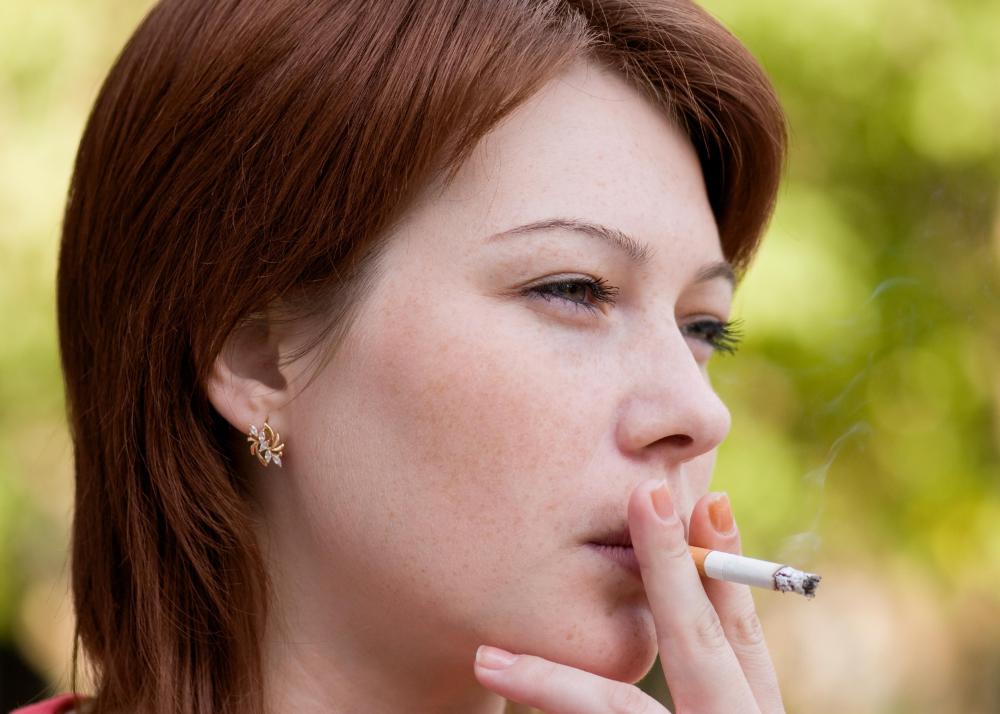At WiseGEEK, we're committed to delivering accurate, trustworthy information. Our expert-authored content is rigorously fact-checked and sourced from credible authorities. Discover how we uphold the highest standards in providing you with reliable knowledge.
How Do I Reduce the Effects of Smoking on the Skin?
Oftentimes, the effects of smoking on the skin are overshadowed by the health problems that this addiction can cause. Smoking decreases blood flow and leaches nutrients, oxygen, and moisture from your skin, which can make it look sallow and dry on a day-to-day basis and cause signs of premature aging later in life. To reduce these issues, use a moisturizer at least twice a day and drink plenty of water. On average, smokers should also take more vitamin C than non-smokers to counteract the detrimental effects of smoking on the skin. Using a topical retinol treatment can help to boost collagen production, preventing some of the wrinkles and fine lines caused by smoking. Despite all of this, the best way to reduce the effects of smoking on the skin is to quit.
Dry skin, which is caused by dehydration, an effect of smoking, can make your skin appear dull and otherwise unhealthy. A good way to reduce this issue is to use a quality moisturizer twice a day, typically in the morning and at night, to provide your skin with the hydration that it needs. In addition to moisturizing, drinking plenty of water can help to not only rehydrate you and your skin, but also prevent dehydration in the future.

A deficiency in vitamin C, which aids in collagen production and helps to protect your skin from toxins, is common among smokers and can have ill effects on your skin and overall health. One of the best ways to improve vitamin C levels, and therefore reduce the effects of smoking on the skin, is to take 35 milligrams more of a vitamin C supplement than is recommended for your gender and age. For example, a non-smoking woman over 18 years of age is generally advised to take 75 milligrams of vitamin C every day. If this same woman smokes, she should take 110 milligrams a day to make up for the vitamin C that is depleted by smoking.

Smoking causes the vessels in your skin to constrict, especially in your face, and this restriction of blood flow reduces the amount of collagen that your skin produces, which is responsible for keeping your skin plump and youthful. To counteract some of these effects of smoking on the skin, using a topical retinol treatment, which is derived from the antioxidant vitamin A, can help to prompt your skin to produce more collagen. While this will not completely reverse damage, it can help if you use the treatment on a regular basis.
Quitting smoking is considered by most medical professionals to be the best way to reduce the effects of smoking on the skin. In as little as a few days without smoking, your hydration levels will improve, and, after three months, your circulation will return to normal, both of which will help to drastically improve the appearance of your skin. Quitting will also limit the amount of exposure that your skin has to harmful toxins, decreasing the amount of damage that your skin experiences, as well as give it time to recover from past harm. While this is perhaps the most difficult of the options to reduce the effects of smoking on the skin, it is most likely to give you visible and lasting results.
AS FEATURED ON:
AS FEATURED ON:












Discussion Comments
@Ana1234 - If you've ever seen a side by side comparison of twins where one has been a lifetime smoker and the other has not, you wouldn't miss the cigarettes. Not on behalf of your skin at least.
I always thought it was just a scare tactic, or that it was because smokers are more likely to have a lifestyle that is hard on the skin, but the difference can be enormous. I guess it's still mostly cosmetic, but I still wouldn't care to have an extra ten years added to my age at a glance because I'd been unable to quit smoking at the same time as my twin managed it.
@Fa5t3r - Smoking can definitely dry out your skin, but I'm not sure it's always a bad thing. I have to confess the thing I miss most about being a smoker was that my skin cleared up while I was smoking. I tend to have oily skin and it's difficult to keep from getting blemishes even with a rigorous routine, I suspect because of internal oil. When my skin dried from the smoking it actually looked better than it ever had before.
I mean, I know it would have eventually become damaged and wrinkled, and I'm grateful that I was able to stop because of the other health effects of smoking, but I really do miss the drier skin.
Make sure you apply your moisturizer before you have your first cigarette of the day, so that it can physically protect your skin from the smoke. You might want to reapply it regularly as well. A lot of the damage is done internally, but being exposed to smoke in the air doesn't really help either.
Another thing you might want to do is religiously apply sunscreen. Nothing is going to completely stop the effects of smoking on the skin, but there's no point in adding the effects of sun damage on top of them.
Post your comments